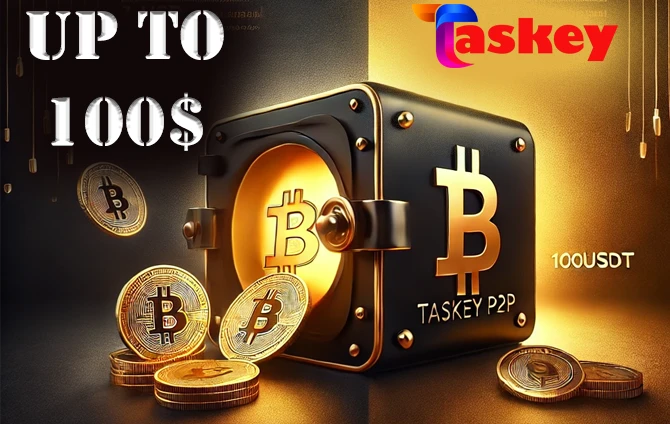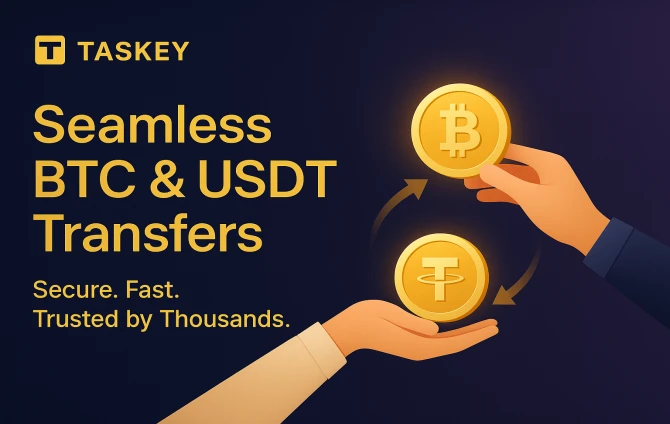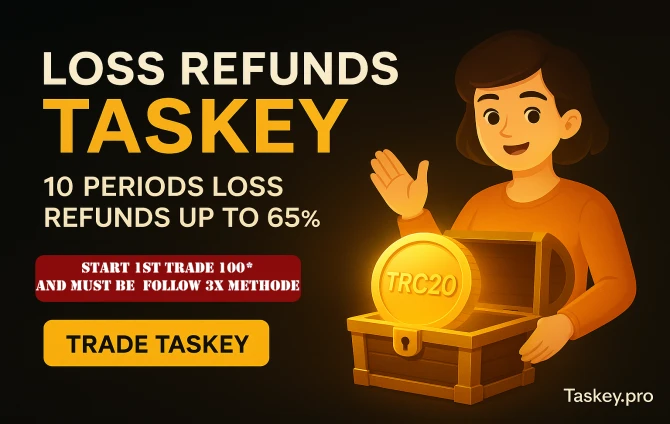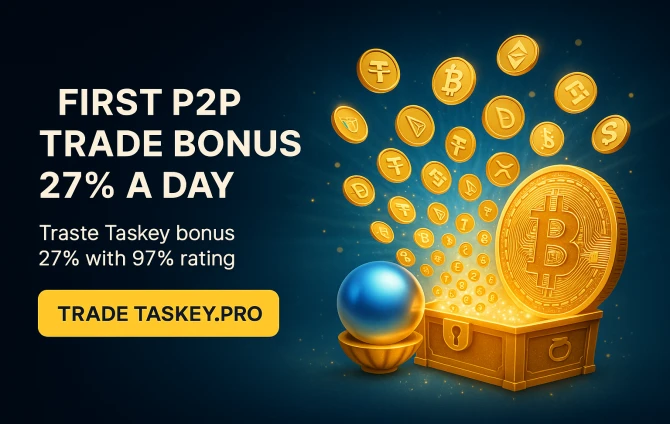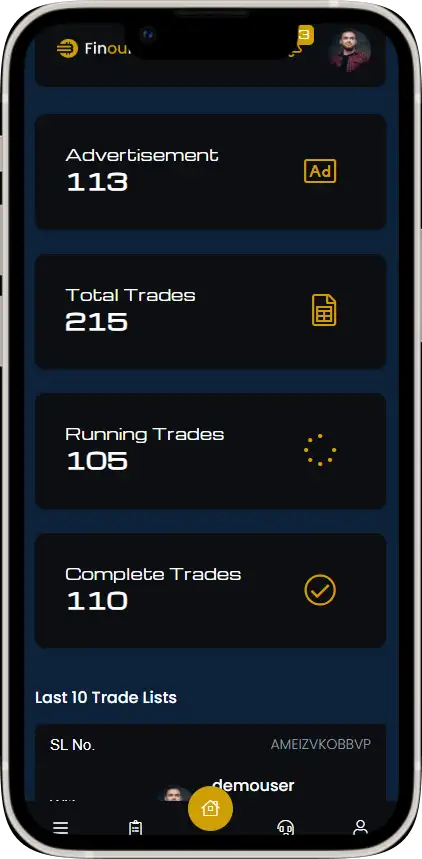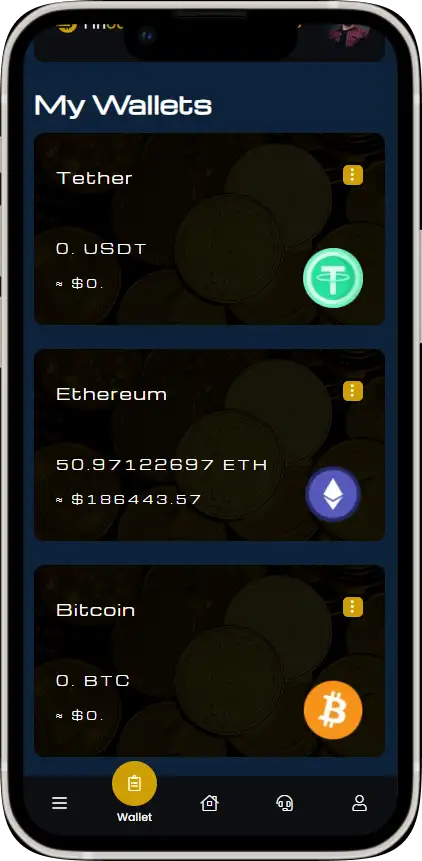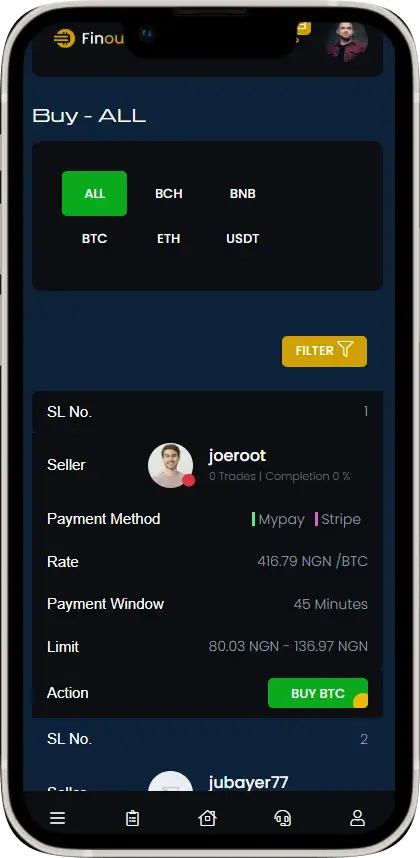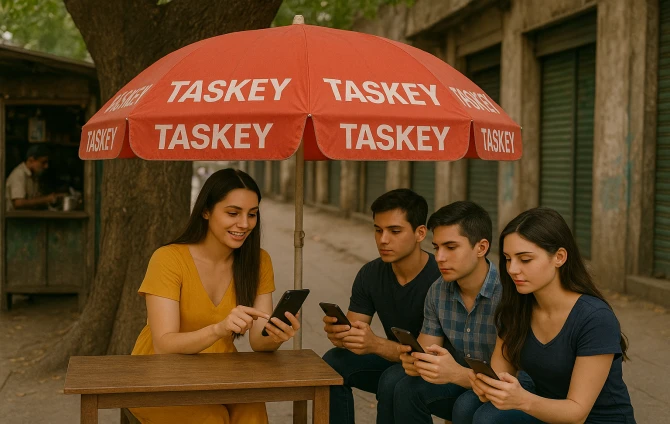
From Sidewalk to Success: How One Woman’s Taskey Referrals Changed Her Life
From Sidewalk to Success: How One Woman’s Taskey Referrals Changed Her Life
The hot midday sun beat down on the cracked footpath of Mirpur Road, as the clamor of buses, rickshaws, and honking motorbikes rolled on without a pause. Among the bustling street vendors and pedestrians, there was a small but striking setup that stood out: a bright red umbrella proudly displaying the name TASKEY in bold white letters, repeated around the shade’s rim. Underneath it sat a determined young woman, no more than 24 years old, dressed in a modest mustard-yellow cotton salwar kameez, a soft scarf draped around her shoulders.
Her name was Anika Rahman.
Every day, Anika came here to the same corner of the busy footpath, carrying a wooden folding table, a stack of forms, and a second-hand Android phone. She would carefully set up her small operation in the shade of a neem tree, just steps away from a steaming tea stall and a row of half-shuttered shops. It wasn’t the fanciest place to run a business — but for Anika, this little street spot had become her gateway to financial freedom.
Anika had learned about Taskey from a friend six months ago. Taskey, a growing financial onboarding and payment platform, was rapidly expanding across Bangladesh, signing up people who didn’t have access to easy online payment systems. Their app allowed users to create verified accounts in just a few minutes, and use those accounts for safe online shopping, paying bills, even saving money with small returns. The best part? Taskey ran a referral program that paid a commission for each successfully activated account.
For Anika, it was an opportunity that was simply too good to ignore.
She had been searching for something — anything — to help her support her younger brother and sister after their father’s passing. The family had been forced to move from their small village near Mymensingh to Dhaka, chasing a chance at survival. Her mother worked as a housemaid in Dhanmondi, and every taka counted. When Anika realized she could use Taskey’s referral program to sign people up and get paid per referral, she decided to try it.
But Anika did more than just try. She turned it into an art form.
Each morning, after making sure her siblings had breakfast and were off to their classes, she would gather her umbrella, a folding chair, the table, a power bank for her phone, and walk to her usual sidewalk pitch. There, she would patiently greet passersby, smiling, offering them free help to open their own Taskey account. The simplicity of it surprised most people.
“Bhaiya, do you have a smartphone?” she would ask politely, with a respectful nod.
“Apni mobile diye Taskey account khulte parben, free. You can get cash rewards too,” she’d explain, showing them the interface on her own phone.
Older rickshaw pullers, bus helpers, small shopkeepers — people who had never thought about digital payments — found her approach refreshing. She was calm, respectful, and completely transparent. Word began to spread.
Within a few weeks, people started coming to her. Some had heard about the small bonuses Taskey gave for new signups. Others were drawn by Anika’s patient, kind explanations, and her promise to walk them through the whole process.
But her biggest advantage? She was trustworthy.
In the crowded, chaotic footpath world where scams were as common as the clatter of bus horns, Anika’s honesty and gentle smile were priceless. She would carefully show each customer how their data stayed safe, and how they could even withdraw their balance through a linked bKash account. As the days went on, her confidence grew.
One day, a group of three young men stopped by, smartphones in hand. They were curious — they’d seen her Taskey sign on the umbrella. They watched her for a while, then asked questions. Anika explained the referral program in detail, showing them how they could earn a small reward by referring friends themselves. That moment sparked something.
They asked, “Apa, can you help us get started with this referral system?”
Anika smiled. “Of course,” she said.
By the end of the afternoon, she had signed up all three, and showed them how to earn commission too.
That was the day Anika realized she wasn’t just signing up customers — she was building a network. If these three boys could bring in more users, and she could help train them, then she’d earn commissions not only from direct signups but potentially a larger community of active Taskey users, giving her a steady flow of passive earnings.
It was a lightbulb moment.
She decided to brand herself properly. Instead of just “help opening accounts,” she rebranded her footpath setup as a Taskey Info Booth, even going as far as printing small leaflets with Taskey’s logo and FAQ answers. A local sign-painter helped her refresh her red umbrella so the name TASKEY was bold and fresh.
Every detail counted.
The local tea-seller beside her, named Mintu, watched in amazement. “Boro business koren dekhi, Apa,” he teased, pouring her a glass of dudh-cha every morning.
“Trying to survive,” she’d laugh. But Anika was more than surviving. By the third month, her Taskey commissions had grown enough to let her buy a second phone just for registrations, hire her cousin to help her manage the rush hours, and even send extra money home to her mother.
Anika’s second phone was a budget Android, but it was fast enough to handle the Taskey app smoothly. She realized quickly that time was money — every second she spent fumbling with one device meant potentially losing customers who were in a hurry. The double phone system allowed her to register two people at once, and sometimes even more if someone needed help recovering a password or verifying an OTP.
Every day, a small line would form in front of her booth. College students, garment workers, rickshaw drivers, and even street vendors with pushcarts — they all wanted to see what this Taskey was about. Some were only curious, but once Anika explained the commissions and bonuses, their eyes lit up.
“Wait,” one young college student said, scratching his head. “So I can earn just by telling my friends to open Taskey too?”
“Yes, exactly,” Anika replied. “You get a reward, and they get a reward too. Plus, it’s safe and official.”
It sounded too good to be true for many, but Anika had proof. She showed her own transaction history. Each week, she’d get commissions directly credited, and she could withdraw via bKash without any hassle. Showing that payment log was the strongest marketing weapon she had.
Soon, Anika wasn’t just explaining Taskey. She was mentoring.
She started giving short “training classes” right there under her umbrella. She explained how to speak politely, how to explain the security features of Taskey, and how to avoid promising impossible rewards. She wanted her growing network to be honest, the way she was, because she believed trust was what kept people coming back.
The word spread beyond Mirpur Road. People from further neighborhoods — Shyamoli, Agargaon, even Mohammadpur — came looking for the Taskey lady. Some were inspired to start their own referral work, asking her for tips on how to pitch. Anika was happy to help, because each new Taskey account fed back into the ecosystem, creating more trust in the platform.
By the end of the fourth month, Anika had opened more than 400 Taskey accounts directly herself, and indirectly helped another 1500 through the small team she coached. Her earnings were enough to help her mother stop working as a housemaid, and even send money for her younger sister’s college admission.
That day was a milestone she would never forget.
Anika’s Big Plan
As the Taskey logo began to feel like part of the street itself, Anika wanted to dream bigger. Could she expand beyond a single booth? Could she set up a chain of these “Taskey Info Booths” across different areas of Dhaka? She even daydreamed of a real shop, with a banner and comfortable chairs, maybe a fan running to keep customers cool.
One evening, while packing up her little table, she mentioned this idea to Mintu, the tea-seller next door.
“Apa, you can do it,” Mintu nodded, handing her a steaming cup. “You’re a business lady now.”
Anika laughed, a warm laugh that surprised her. Just months ago, she’d never imagined herself in this role — a trainer, a mentor, a business lady. But now, the idea no longer seemed impossible.
She decided to test the waters by training a second cousin named Tarek, who was jobless after finishing HSC. She gave him her old phone, showed him the Taskey basics, and told him to set up in a different busy location near Technical intersection. He was hesitant at first, but after watching Anika’s method, he grew confident.
By the next month, Tarek was signing up 30–40 new Taskey users a week, sending Anika a small share of the commissions in return for her guidance. It was a win-win, and Anika’s eyes began to open to the power of scaling.
The Taskey Family Grows
It wasn’t long before Anika’s mother started helping as well — not directly registering people, but preparing tea, snacks, and fresh leaflets from home. Even her sister pitched in after college classes, printing Taskey QR codes and helping Anika sort out customer records.
It felt like a family business, though one running in the open air of a chaotic street.
Anika would often pause between customers and glance around: bus drivers yelling destinations, rickshaw-pullers ringing their bells, tired factory workers trudging past, sometimes stopping for a curious look. In that swirl of daily survival, Anika’s red Taskey umbrella felt like an island of possibility.
People found more than just a service there — they found hope. They found someone who listened to their questions, who didn’t rush them, who smiled and explained each step with patience.
It was this — the human connection — that made Anika’s referrals soar.
A Turning Point
One Thursday, after a particularly hot day, Anika was closing up when a well-dressed man in his thirties approached her. He wore formal black pants and a branded polo shirt.
“Apni Anika?” he asked politely.
“Yes, that’s me,” she answered, a bit nervous.
“I’m from Taskey head office,” he smiled, showing his ID. “We’ve heard about your success from our system logs. You’re one of our best referral partners in Dhaka.”
Anika froze for a moment, then smiled back, shocked.
He continued, “We would like to officially make you a Taskey Ambassador. That means you’ll get higher commissions, plus some promotional support from our marketing budget.”
Anika could hardly believe it. Tears of joy nearly welled in her eyes.
This was real. After months of grinding on the sidewalk, training people, showing them trust, she was now recognized by the company itself.
A New Chapter
With her new ambassador status, Anika was able to get branded banners, an even bigger umbrella, and Taskey posters that made her sidewalk pitch look professional. It no longer looked like a makeshift street booth; it was becoming an official onboarding center.
Anika took this chance to expand her impact even further. She posted on Facebook, telling everyone about a free Taskey training class every Sunday afternoon. The next week, ten young men and women showed up, eager to learn how they could also earn through referrals.
She taught them everything — how to answer common questions, how to demonstrate the app, how to keep records safely, and how to treat every customer with respect.
Her network was now more than a team — it was a movement.
The Power of Empowerment
In the months that followed, Anika built up a network of over 45 part-time Taskey promoters, working at different corners of the city, each earning something for themselves while building trust in the brand.
Some were college dropouts who never thought they’d have a second chance. Some were single mothers who used their earnings to pay school fees. Some were men who had lost work in a factory closure and were desperate for any honest source of income.
Anika made it clear to every trainee: “We are not cheating people. We are showing them opportunity. Always be honest, always be helpful.”
That code of honor stuck, and it was why customers kept coming back.
A Bigger Dream
Six months after becoming a Taskey Ambassador, Anika had saved enough to rent a small one-room shop near the main bus depot. She decorated it with bright green Taskey posters, installed a fan, a secondhand desk, and put up a sign that proudly read:
TASKET POINT — OFFICIAL TASKET ACCOUNT OPENING & TRAINING CENTER
The place bustled every day, from dawn to dusk. People still recognized her, and many of her old sidewalk clients would wave from rickshaws, calling out “Anika Apa!”
She would smile and wave back, remembering those long, hot days under the neem tree.
Anika’s new shop changed her life in countless ways. For one, she no longer had to fight the dust and heat every single day, though she still missed the rhythm of the street. Now, her customers came to her sitting comfortably on plastic chairs while she worked behind a small wooden desk. It felt… official.
Every morning, she unlocked the rolling shutter, swept the tiled floor, checked her Taskey account for payments, and got ready for a full day of service. Her cousins sometimes helped, still handling the sidewalk booth on weekends, so the street presence was never lost. That strategy worked well, since not everyone was willing to walk into a shop — but plenty would talk to someone standing right on the footpath.
Between the two setups, Anika’s little operation covered hundreds of signups every week.
She still trained new Taskey promoters every Sunday. Her mother would brew a giant pot of tea, and people would gather at the shop after closing hours to share their referral experiences. They discussed challenges, like what to say to suspicious older customers, or how to handle multiple people in a rush.
In those tea-fueled conversations, Anika realized something deeper was happening: they weren’t just working for commissions. They were building community. They trusted one another, swapped tips, and sometimes helped each other find paying customers in new areas.
The Brand Grows
As Taskey’s name spread, Anika’s team started getting invited to community fairs and local NGO events. They were asked to set up a table to help people register for digital wallets and explain secure online payments.
One day, Anika was invited to a skills fair in Mohammadpur, hosted by a women’s entrepreneurship association. She wore a simple green-and-white cotton kurti and brought her laminated Taskey training posters.
At first, she was nervous — she’d never spoken in front of a crowd before. But as she looked across rows of young women, many in their early twenties, hoping for a way out of poverty, she found courage.
She spoke clearly about how she had started with nothing but a single umbrella, a secondhand phone, and a simple idea.
“I was like you,” she said with a smile. “I had no shop, no investor, just this one chance.”
She held up her phone. “But this phone, and Taskey’s referral program, gave me the key to stand up again. And you can too.”
The applause was warm, respectful, and full of hope. Dozens of young women signed up to visit her shop for more training. That night, Anika realized she had crossed a milestone: she was no longer only earning — she was inspiring.
Building Stability
By the end of the first year, Anika was making enough commission to not only support her family but also start saving for the future. She opened a DPS (Deposit Pension Scheme) account with a local bank and began putting away a portion of her income each month.
Her brother got accepted into a technical college, while her sister started a diploma in computer science.
It made Anika proud beyond measure — she had carried them through.
Of course, there were challenges. Sometimes, Taskey app bugs caused delays in signups, or customers complained about verification problems. Anika had to field those complaints with patience, reassuring everyone until it was fixed. Other times, competitors showed up, offering higher signup bonuses for other platforms. But Anika’s honesty and loyalty to Taskey kept most of her customers coming back.
The Changing City
Dhaka itself was changing. More and more people were going cashless, using digital wallets, paying bills online. When Anika first started, many rickshaw-pullers were suspicious of apps. One year later, even they were scanning QR codes to pay for a cup of tea.
Anika’s skills evolved with this digital wave. She began helping customers not just with Taskey, but also showing them how to pay for gas bills, recharge their phones, even book bus tickets online. She effectively became a digital guide for the local people, which made her shop even more valuable.
The trust she built was her true currency.
Scaling to New Heights
After a year and a half, Anika expanded again. This time, she rented a small corner in a bustling market near Gabtoli, where daily laborers and transport workers passed through. She trained one of her top promoters, Ruma, to manage that new location.
By then, Anika had a small fleet of eight promoters, all trained by her, each working a neighborhood. They stayed connected through a WhatsApp group, where Anika posted motivational messages every morning:
“Honesty first. Respect second. Commission will follow!”
Her growing business was unofficially known around Dhaka as Anika Taskey Centre. Even the Taskey regional team began referring people to her if they had problems.
She had become the face of Taskey for thousands.
A Moment of Reflection
One night, while closing her shop, Anika sat quietly on her stool, listening to the distant hum of buses and night call to prayer echoing over rooftops. She thought of how it all began: a battered umbrella, a table, a secondhand phone, and nothing more than hope.
Now, she was a community leader, a digital entrepreneur, and a lifeline for many who wanted a way out of poverty.
Sometimes the path still scared her — would the commissions last? Would the system change? What if Taskey shut down?
But then she reminded herself of what she had truly built: skills, trust, community. Those could never be taken away.
She closed her eyes and let a grateful tear roll down her cheek.
The Ripple Effect
Anika’s success created ripples.
Other companies noticed how Taskey’s referral model had worked on the streets of Dhaka. They tried to copy her sidewalk style — some even opened similar booths. But they struggled to match her community trust, because they didn’t have Anika’s heart.
That heart showed up every time she helped an old rickshaw driver understand his PIN, or when she sat for twenty minutes explaining a form to a shy garment worker.
Her empathy was her secret.
Legacy in Motion
As Anika approached her second year with Taskey, she decided to launch a micro-scholarship program for local young girls who wanted to learn digital skills. She set aside a small fund from her commissions and printed flyers offering weekend classes on how to open an email account, how to stay safe online, and how to use mobile banking.
People couldn’t believe she was doing this for free.
“Why?” they asked.
Anika would smile, pointing at her Taskey sign. “Because this saved my life. Now I can help save yours.”
Looking to the Future
Anika had dreams far beyond Taskey itself. She wanted to create a Digital Empowerment Centre, a bigger version of her current shop, with computers, training classes, and even a small children’s area for young mothers to leave their kids while learning.
She wrote it down in a little green diary:
“2026: Digital Empowerment Centre.”
Every night she read it before bed, imagining the bright green sign outside, imagining rows of people getting trained, imagining how a simple sidewalk booth had become a stepping-stone to something massive.
She knew it would happen — because she had proven she could do anything with hard work.
Lessons from Anika’s Story
Anika’s journey, from a broken sidewalk table to a respected community business, is more than just a tale of earning commissions. It’s a blueprint:
✅ Start small, but think big.
✅ Build trust above all else.
✅ Never cheat customers, even if the short-term money is tempting.
✅ Use technology to lift people up, not just to make money.
✅ Grow by helping others grow.
If someone like Anika could go from selling signups on a dusty footpath to running a team of trained digital marketers, anyone could do the same — with heart, patience, and consistency.
Conclusion
From the first day under that battered red umbrella, to the moment she dreamed of a Digital Empowerment Centre, Anika’s story is one of courage and purpose. She showed how even the toughest streets of a bustling city could blossom with new opportunities, if only someone believed enough to try.
Her daily routine — greeting strangers, earning one signup at a time, teaching, inspiring, growing — was more than a business. It was a revolution in trust.
And as she closed her shop each evening, watching the city lights glow against the night sky, Anika knew one thing for certain:
The journey wasn’t over yet.
Building a Real Business
After two years of unstoppable growth, Anika’s shop had transformed beyond recognition. What began as a sidewalk table now looked like a modern micro-office: a glass-fronted cubicle, with neat Taskey branding, two ceiling fans, a row of plastic chairs, and a dedicated counter with two trained staff to handle daily signups.
She installed a small printer to help customers print their Taskey QR codes, or even get an official application form if they needed. Over time, she added a photocopy machine and a lamination service, because she realized so many people still needed to process IDs, documents, and other verifications.
These small add-ons created even more income streams.
Anika was no longer just a referral agent. She was the founder of a community tech hub.
The Team Grows
Her cousin Tarek had grown into a confident manager. He oversaw the footpath booth while Anika worked mostly from her new shop. Ruma, the young woman who’d trained under her, became a supervisor for the Gabtoli branch, which was growing fast.
Anika now had over 25 “agents” working under her, all across Dhaka. They operated with simple instructions:
✅ Always verify the customer’s phone and NID.
✅ Always explain security clearly.
✅ Never lie.
Trust was still the backbone of her empire.
The Taskey company took notice again. They called Anika to their head office, where a formal regional manager gave her a certificate naming her the Best Taskey Brand Promoter of the Year. She took a photo holding the certificate with tears in her eyes, then framed it on her shop wall for every customer to see.
The Neighborhood Changes
By the third year, her entire area around Mirpur Road had changed. Street vendors were more organized. Digital payment signs were everywhere. Even the small tea-stall owners took cashless payments. The Taskey brand — once an odd curiosity — had become a household name.
Some of Anika’s earliest customers still dropped by, bringing new family members to register, telling her proudly:
“Apa, dekhen, amar meyeo Taskey use kore!”
(“Sister, look, even my daughter uses Taskey now!”)
Those moments were her reward beyond money.
Giving Back
Anika felt grateful. With every milestone, she looked for ways to share her luck. She kept growing the scholarship fund for local girls who wanted to learn technology. She donated internet data packages to students during exam months, and even gave away free phone top-ups to struggling rickshaw-pullers who had signed up with her.
The effect was huge. People started calling her not just Anika Apa but Anika Ustad — “teacher Anika.”
She never expected that respect, but she wore it with pride.
Digital Empowerment Centre
In 2026, she took the biggest leap yet. Anika signed a lease on a 900-square-foot commercial space on the second floor of a building near Mirpur Circle. She painted its walls bright green, put up motivational posters, and installed five second-hand computers.
She named it Anika Digital Empowerment Centre.
There, people could learn about:
✅ Digital security
✅ Mobile banking
✅ Freelancing skills
✅ English for beginners
✅ Basic computer literacy
And, of course, they could sign up for Taskey.
She trained five new instructors from her old network, paying them a fair monthly salary. That way, the centre stayed open even if Anika needed a rest day.
It was a dream come true — a place where even a rickshaw-puller’s daughter could learn about modern technology without fear or shame.
Beyond Commissions
By then, Taskey’s referral commissions were still paying a big chunk of Anika’s bills, but she had diversified. She offered print services, basic digital troubleshooting, bill payment assistance, and eventually micro-loans for qualified customers.
Her dream had become self-sustaining.
Sometimes, people from other cities came to see her centre and asked, “How can we make this in Barisal? In Rangpur? In Khulna?”
Anika smiled, thinking back to that battered umbrella from years before.
“You can start small,” she told them. “If I can, so can you.”
Family Stability
Anika’s sister graduated with her diploma in computer science and started working as an instructor in the Empowerment Centre. Her brother completed his degree in engineering, and helped install solar panels on the building’s rooftop to lower their electricity bills.
For the first time in Anika’s memory, her family had no debts, no stress, no fear of the next month’s rent.
That peace felt like a miracle.
Anika’s Mission
By the end of 2026, she had one mission on her mind:
“No one left behind.”
She wanted every street worker, every tea-seller, every garment helper to know they deserved the same digital opportunities as anyone else. So she took her team on a campaign, handing out leaflets and doing open-air digital education sessions right in the streets.
Her voice, once shy and hesitant, boomed through a small loudspeaker:
“Brothers and sisters, no one will cheat you. I am here. Taskey is here. Come and learn!”
People applauded.
Recognition
That winter, Anika was invited to a national entrepreneurship conference in Dhaka. She stepped on a stage with bright lights, wearing a simple cotton saree, and told the story of her battered umbrella to a stunned crowd of bankers, corporate leaders, and government officials.
By the end of her speech, the hall erupted in applause. Some even stood to clap.
Afterward, a big bank’s manager offered her a partnership program. NGOs asked if they could fund her centre to scale to more cities.
Anika went home that night in a daze, holding a bouquet of roses someone had given her, thinking:
“This is what happens when you never give up.”
Her Vision
In 2027, Anika dreamed even bigger. She wanted a proper school — with real classrooms, smartboards, scholarships for girls, daycare for single mothers, and proper career counseling. She knew it would take years to build, but she had a plan.
Every month, she set aside a tiny bit from her commission, and from her Empowerment Centre’s fees, saving it carefully in a separate account.
The Long View
When people asked, “Apa, how long will you do this Taskey work?”
Anika smiled, “As long as people trust me.”
She knew the platform might change. Technology might shift. But she had grown powerful skills — marketing, customer service, financial planning, training, leadership — skills no one could take away.
So if one day Taskey was gone, Anika would still be standing. Because she’d built her foundation on helping people, not only chasing commission.
The Final Lesson
By the time her Empowerment Centre celebrated its second anniversary, Anika’s story had become legendary in Mirpur. The girl who once sat under a neem tree with a red umbrella had trained over 300 digital ambassadors across the city.
She had proven that you could transform an entire neighborhood by giving knowledge, patience, and trust.
The Last Chapter
One evening, she stepped out onto the roof of her Empowerment Centre, looking down on the bustling city below. Buses still roared by, neon lights still blinked, and people still carried their worries through the crowded streets.
But there, rising above it all, stood a young woman who had refused to be broken.
She had built an empire of hope, one mobile signup at a time.
The Expansion Dream
By 2028, Anika’s dream had shifted from one city to many. She began reaching out to old school friends who had moved to other towns. Places like Bogura, Barisal, Jessore — cities with the same working-class communities, the same unbanked, the same digital divide she had seen in Mirpur.
Her proposal was simple:
✅ She would help them start a branch
✅ She would send the branded umbrellas
✅ She would train their staff
✅ They could keep 70% of the earnings, and send 30% back to support the scholarship fund
Within a year, she had five cities under her brand. Each location was a simple sidewalk booth, maybe a desk in front of a tea-stall, maybe a small corner shop, but all carried the same Taskey logo and Anika’s promise of honesty.
Nationwide Network
Soon, Anika realized the model needed more formal structure. She built a tiny website on WordPress with a friend’s help, showcasing:
-
How to join her program
-
The Taskey referral scheme
-
Testimonials of people who changed their lives
-
A contact number for help
The website surprised even her: it brought in dozens of applications from young people all over the country. They wanted to copy Anika’s system and be part of something positive.
Training Day
Every quarter, Anika invited 20–30 new agents to her Empowerment Centre in Dhaka for a weekend workshop. She made tea, printed name badges, even arranged biscuits and bottled water. The agenda was clear:
✅ Be honest
✅ Be patient
✅ Never oversell
✅ Explain everything clearly
Then she’d walk them through the referral app line by line, letting them practice on each other’s phones until they could answer any question with confidence.
She ended every training session with a personal handshake, looking each new agent in the eye and saying:
“Your community is counting on you. Don’t betray their trust.”
That single sentence became the motto of her growing network.
Anika’s Personal Life
Even while Anika’s business thrived, she kept her personal life simple. She lived with her family in a modest two-bedroom flat. Her mother, now retired, loved gardening on the small balcony. Her sister was teaching computer literacy at the Empowerment Centre, while her brother took up a part-time job helping a solar company.
Anika received several proposals from men who admired her courage, but she politely refused — she wanted to build her dream first, then think about marriage. Her focus was still sharp: expand Taskey signups, expand education, and expand hope.
Setbacks
Of course, success was never smooth forever.
One year, a wave of fraud attempts rocked the entire digital payment industry. Fake NIDs, stolen SIM cards, people trying to collect bonuses with phony referrals — it hit Taskey hard.
Some of Anika’s agents panicked and quit. She spent nights rechecking accounts, apologizing to customers, sitting with Taskey’s head office staff to fix mistakes.
It was the hardest challenge of her life.
But instead of breaking, she adapted. She added a strict ID cross-check. She created a trust register, where only known, properly verified agents could get signup permissions. She explained to each customer why she was being extra careful.
People respected that.
Anika’s honesty and discipline saved her network.
National Recognition
By 2029, Taskey itself was holding a national awards program. Anika was nominated as “Most Trusted Partner” and invited to speak at a gala in a fancy hotel ballroom. She had never stepped foot inside a five-star hotel before.
Her green cotton saree stood out among the corporate suits. But when she took the microphone, her voice was steady.
She told the audience:
“I started with one umbrella, one secondhand phone, and my faith. Today, I feed over fifty families because of Taskey. And I will never stop.”
Thunderous applause roared through the ballroom.
Branching Out
A major NGO, hearing her story, offered a grant to replicate her model in rural areas. Villages around Rangpur, Kurigram, Bhola — where the unbanked rates were still painfully high — needed the same program.
Anika jumped at the chance. She trained rural women to do exactly what she had done, turning them into digital ambassadors with nothing but a phone and a branded umbrella.
Slowly, Taskey became part of even rural Bangladesh’s vocabulary.
The Children’s Corner
Anika also kept investing in her dream of helping children. In 2030, she converted one corner of the Empowerment Centre into a children’s digital lab with used tablets and free internet.
Kids who sold flowers on the street, or polished shoes, could come in after hours, sit on the floor with a teacher, and learn to draw, type, or even play educational games.
It was a small step, but to Anika, it felt like planting a forest one seed at a time.
Legacy
By her mid-thirties, Anika had become a role model nationwide. Journalists visited her shops. TV channels interviewed her. Even her old neighbors in the village bragged:
“We know Anika Apa. She is ours!”
Sometimes, standing on her shop rooftop, she’d think back to that dusty day under the neem tree, the first day she dared to set up a Taskey sign.
“If I had been too scared then,” she thought, “none of this would exist.”
The Bigger Vision
Anika’s final dream was to build a full-fledged Digital Academy — with proper teachers, government-approved curriculum, even scholarships for the best students to study abroad.
She knew it would take decades.
But she had proven to herself again and again:
✅ Dream
✅ Plan
✅ Work
✅ Repeat
Nothing was impossible.
Final Reflection
One evening in 2031, Anika sat with her mother on the balcony, drinking tea as the sun set.
Her mother, wrinkled and gentle, smiled.
“You have given so many people hope,” she said softly.
Anika looked down at her own rough hands, remembering the dozens of lives she had touched — rickshaw drivers, tea sellers, working mothers, little kids who had never held a tablet.
She thought of all their stories, weaving together into one unstoppable force of change.
“It was all worth it,” Anika whispered, as a peaceful tear fell.
She had turned a dusty footpath business into a nationwide beacon of trust and opportunity.
And she knew, deep in her heart, the journey was only just beginning.
Training the Next Generation
As the years went by, Anika noticed a new trend: many of the young girls she trained were hungry for more than just a commission. They wanted to lead.
In 2032, she launched an advanced mentorship program from her Empowerment Centre. It was called the Digital Leaders Fellowship, a six-month track where participants learned:
✅ public speaking
✅ digital security
✅ customer service
✅ basic accounting
✅ community organizing
She chose 15 fellows per batch. These young women came from struggling families, often unable to even dream of a white-collar future. But with Anika’s guidance, they learned not only how to use an app — they learned how to build trust, manage a team, and grow a business from the ground up.
By the time they graduated, many went on to open their own small Taskey booths or even other service businesses, like bKash shops or mini pharmacies.
Anika had planted leaders who would carry on her mission long after she was gone.
Going Global
Around 2033, a surprising email arrived. A social entrepreneurship foundation in Singapore had read about Anika’s work and invited her to a global conference. They wanted her to share how she had turned a simple street business into a national empowerment network.
At first, Anika was terrified. She had never left Bangladesh before. But she gathered her courage, took her passport, and boarded a plane — trembling with both fear and excitement.
At the conference, she spoke in halting English about honesty, fairness, and community trust.
To her shock, the room gave her a standing ovation.
Entrepreneurs from Africa, India, even South America came up afterward, saying:
“How did you keep people honest?”
“How do you teach trust?”
Anika realized her work was universal. Whether in Dhaka or Nairobi, people needed dignity and confidence as much as they needed a bank account.
The Global Pilot
Inspired by those conversations, Anika launched a small pilot program with a contact from Nairobi. They tried a tiny Taskey-like referral booth there, using local M-PESA wallets instead of bKash.
It was challenging — language, culture, systems — but it proved one big truth:
✅ People anywhere can be empowered if you meet them where they are.
That pilot was small, but Anika considered it the first brick of an international legacy.
A New Challenge
By 2035, new technologies were changing the market again. Crypto wallets, blockchain IDs, AI-powered KYC systems — customers wanted faster, more secure onboarding.
Some of Anika’s team members were worried they’d be left behind.
But Anika did what she always did: she learned. She took free online courses about blockchain, attended webinars, and then brought back that knowledge to train her whole team.
Her motto never changed:
“If we do not learn, we cannot help.”
That future-focused mindset kept her relevant while other small booths shut down.
The Human Touch
Even with robots, apps, and automated forms, Anika insisted on one thing:
✅ Human connection.
She taught every new agent that even if the process was 99% digital, people still needed to feel welcome, respected, heard.
So whenever a frustrated grandmother showed up with a locked PIN, Anika would calmly explain things, reassure her, and do a gentle smile.
That empathy could never be coded into a machine.
Family Roots
By 2036, Anika’s family was fully secure. Her sister was now running the children’s lab, teaching kids coding basics. Her brother had opened a solar installation business with the savings from his earlier salary.
Their mother, who had once struggled cleaning houses, now sat proudly in a small rocking chair on the Empowerment Centre balcony, watering the flowers and greeting visitors.
“Eita amar meyer empire,” she would say proudly to anyone who listened.
(This is my daughter’s empire.)
National Influence
Politicians began to notice Anika’s grassroots power. Some even came to ask for her endorsement, but she refused to become a political pawn.
“I belong to the people,” she told them politely.
Instead, she used her influence to push for better digital literacy in the national school curriculum. Slowly, thanks to her efforts, basic digital skills classes became mandatory in high school across the country.
That was the change she was most proud of — planting skills in every child’s path.
The Documentary
In 2037, an international film crew made a documentary about Anika. They followed her for weeks, filming at the Empowerment Centre, on her rooftop, on the street corners where she once sat with her umbrella.
They showed her teaching women, helping kids, balancing her accounts by lamplight, always with that same kind smile.
When it was released online, it went viral — watched by millions.
People from around the world wrote to her:
“You have given me courage.”
“I want to try to help my community too.”
Anika wept reading those messages. It reminded her how one act of courage could ripple far beyond borders.
Final Reflection
By 2040, Anika had touched tens of thousands of lives, directly or indirectly. Some of her former trainees were now running entire training schools of their own. Others were community leaders, inspired by her story of honesty and hustle.
One day, a reporter asked,
“Anika Apa, what is your legacy?”
She paused, looking at the growing line of customers outside her Empowerment Centre, then down at her mother’s gentle hands.
“My legacy,” she said softly, “is that I made people believe in themselves.”
And that, she thought, was a legacy no money could ever buy.

